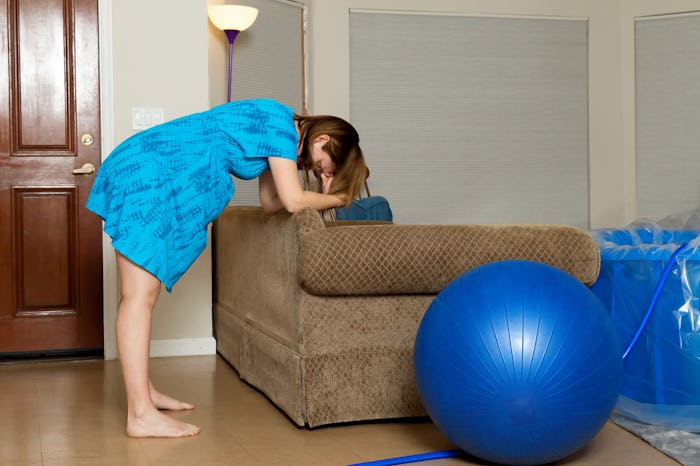Life

5 Myths About Contractions That Have No Business In Your Birth Plan
There are a lot of myths surrounding childbirth, especially because everyone's experience is different. Whether you have a vaginal birth or a C-section, deliver through an emergency or in a relaxed environment, everybody can agree on one thing — giving birth can be really difficult. When you add in all of those myths, it can also be super scary, especially when thinking about contractions. I know people are trying to help, but when everyone starts sharing myths about contractions, all it does is efficiently freak you out.
Look, contractions sound scary enough. And you probably know the basics about them — they can intensify as they progress, they are there to essentially push your baby out, and they aren't exactly relaxing. But there are a few misconceptions and myths about them that may make labor and delivery even scarier than usual.
Education is pretty much the key to getting past your fears, especially with childbirth. Try not to get too wrapped up in what your well-meaning friends and family tell you — every birth is different. But do be aware of contractions, read up on what they are, how they happen, and what they mean. And then banish these five myths about contractions from your brain so you can worry a little less.
Myth #1: They'll Kick In As Soon As Your Water Breaks
Yeah, birth isn't always like the movies. If you're expecting to have your water break and then suddenly clutch your stomach because the contractions are right there and already a minute apart, you may be disappointed. I'm sure that happens, but according to Today's Parent, your contractions start 12 to 24 hours after your water breaks. Baby Center also noted that contractions may have started before your water broke, even if it's a day or two beforehand.
Myth #2: Contractions Always Mean Labor Is Happening
I know, feeling any type of contraction while pregnant is bound to make you pause and wonder what's going on. But contractions don't always mean labor is imminent. Baby Center noted that irregular, unpredictable contractions that vary in intensity and length, and can go away when you change positions or increase activity are considered false labor pains. You can also experience contractions if you're dehydrated according to the American Pregnancy Association, so be sure to drink plenty of water and stay hydrated.
Myth #3: Pitocin Contractions Hurt More Than Natural Contractions
Pitocin's no walk in the park, but the myth that Pitocin-induced contractions hurt more than natural contractions isn't exactly true. Fit Pregnancy noted that the difference is that Pitocin skips the "soft labor" stage and puts you right in the middle of intense, hard labor in order to deliver your baby. It gives you really strong contractions, but it doesn't gradually lead up to them like natural labor progression does.
Myth #4: Feeling Contractions After Sex Is Bad
You're pregnant, you're doing the deed, and you realize that after you orgasm, you can feel some unsettling contractions. Don't panic. According to Parents, it's normal for an orgasm, and the prostaglandins in semen, to cause uterine contractions. If the cramping gets worse or is followed by spotting or bleeding, call your doctor.
Myth #5: You Can Induce Contractions Naturally Without Issues
I know, you've heard to drink castor oil, to eat spicy foods, and to have plenty of sex in order to start up your contractions. But Fit Pregnancy noted that not only do these methods sometimes fail, but even if they do work, they may leave you dehydrated, with explosive diarrhea, having contractions that are too strong and too close together, and more nasty side effects. It's best to just let your body do what it needs to do and the contractions will come.